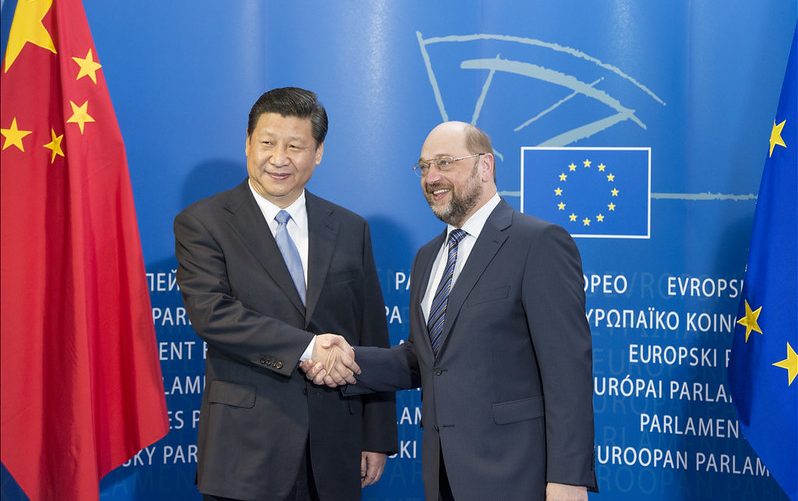Imagine the following situation: someone is trying to reach a given destination in town but at a certain point feels lost. The person looks around until he sees another man whom he deems a local and decides to ask him for directions. Standing opposite to one another, the local responds by saying “you can get there by going left.” The outsider, giving no further thoughts to it, proceeds his trajectory to his left. The local, noticing the man is going the wrong way, immediately stops him saying “Sir, I’m afraid that’s the wrong direction. You have to go left,” only to see him heading towards the opposite way over and over again.
Many of us could sort this situation out very easily. Today, however, it could be argued that such a seemingly petty deadlock situation is exactly the one we are witnessing when prominent Western countries and China are interacting with each other. Apparently, other than failing to identify common points of interest, there is a problem of perspective—and one of reluctance too.
It should be noted that the imagined anecdote in the introduction shows that the incomplete and unclear exchange of information is a result of the empathy both parties involved lack. China — portrayed as the local in this imaginary anecdote — does not bother to clarify its position as it defends its sovereignty, nor does it seek to understand what the democratic values at stake in the West truly stand for. The latter actor in turn—the outsider—also does not seem to care about understanding the underlying principles held by the Chinese Communist Party (CCP) or what they truly mean by “democracy.”
Apparently, there is little or no political will to try to understand what the items of the counterpart’s political agenda are based on. Curbing the negotiations solely to economic interests and indicators could lead to further challenges if ideological motivations are sidelined. Genuine and win-win cooperation can be fully achieved if all parties know what their intentions are constituted by. To make the problem worse, media outlets cover such events by opting for catchy or sensationalist language; yet it can often be misleading due to misusage. As a result, a misconception is created within Western societies, impairing public perception and political as well as corporate decisions.
So, what should consolidated Western liberal democracies grasp about an autocratic state that also dictates democratic values? Was the culmination of the EU-China Comprehensive Agreement Investment (CAI) — recently halted on allegations of human rights violations in Xinjiang and Hong Kong — a result of disregard or lack of understanding of the principles at stake in China’s foreign policy? Is this a mere matter of failing to identify ideological differences?
Political Power in China
In China, power is heavily concentrated on the hands of the CCP. As a one-party socialist and unitary entity, the country’s political system relies solely on decisions and measures adopted off the Party’s agenda, whose priorities do not necessarily reflect those of the populace. Having no actual power split, Chinese legislation is operated by a unicameral congress, the National People’s Congress of the People’s Republic of China (NPC), whose activities are largely operated by the Standing Committee of the National People’s Congress (NPCSC).
Yet, apart from the more obvious distinctions regarding the institutional arrangement, some key ideological — one might even say purely conceptual — make the political dynamics in China very unique and different if compared to that of Western liberal democracies.
Last March, a Swedish think tank on China released a report entitled “The Decoding China Dictionary,” in which they provide an interpretation of the Chinese government’s core principles as a guide to make a better interpretation of China’s rhetoric on the international stage. This article is intended to expand on the clarification of three of them: democracy, rule of law, and sovereignty.
Chinese “Democracy”
As briefly elaborated in the report, the CCP’s view of democracy has its roots in the Marxist-Leninist doctrine. This version of democracy is primarily characterized by three notions: people’s democratic dictatorship; democratic centralism; and consultative democracy. The first one is mentioned a couple of times in the Constitution of the People’s Republic of China (PRC)’s preamble and dictated in the very first article of the text. “Dictatorship,” in the Marxist sense, represents the phase in which the political transformation of a capitalist society to a communist one would occur. In this period, the state is—theoretically—the “revolutionary dictatorship of the proletariat.”
Yet, as it is also described in the PRC’s constitution and constantly expressed by Xi Jinping, the CCP couples this notion with a socialist democratic system featured by “Chinese characteristics,” meaning that the Party is the entity entitled to speak and decide for its people. This is related to the second notion, referred to as “democratic centralism,” which characterizes the CCP as the sole power holder over all other state organs, including the judiciary.
As for the “consultative democracy,” the Chinese People’s Political Consultative Conference (CPPCC) is the platform that materializes such a notion. During its yearly sessions “various political parties, people’s organizations, and people of all ethnic groups and from all sectors of society in ‘democratically participating’ in state affairs.” The purpose of the CPPCC, put simply, is to serve the Party as an advisory mechanism by making proposals on important political and social issues.
Chinese Rule of Law
The preamble of China’s Constitution lays down that the country will continue to “improve socialist rule of law” and, as it is later dictated in Article 5, that “The People’s Republic of China shall practice law-based governance and build a socialist state under the rule of law.” The Decoding China Dictionary makes reference to the definition formally assumed by the United Nations as a principle of governance dictating that all public and private persons and entities, “including the State itself,” may be held accountable, equally constrained, and independently adjudicated, “and which are consistent with international human rights norms and standards.”
If the concept of rule of law is limited to liberal societies, the definition above could be expanded to the notion of a constitution that protects individual rights and establishes the norms for democratic elections as well as the separation of powers that represent the political institutions of a given country. In respect of that, as exposed before, China would not be within the conceptual boundaries of a liberal rule of law since the central government, the CCP, has “arbitrary power over the law and even the Constitution because its one-party rule is supreme.”
This impartiality of the judiciary and the monopolized political power of the Party — among many other elements — compromise any attempt to label China as a liberal democracy, so it should not be seen as such. As some would point out, rule of law is liberal and it “necessarily prevents unlimited governmental power.” According to a Communique of the Fourth Plenary Session of the 18th Central Committee of the CCP, today’s Chinese rule of law poses a system of rules and regulations within the Party structure that enables it to enforce its policies more efficiently. So, again, their concept of rule of law is largely intended to assure the functioning and power of the central government, whose decisions and policies are law-based to the interests of the CCP.
Chinese Sovereignty
Since our case addresses the interactions between different state entities, rather than exposing the internal aspect of sovereignty — also known as “sovereign authority,” which is performed by the state within its borders — it makes more sense to focus on “external sovereignty,” which is exerted under the norms of international law. That means a state’s sovereignty depends on the recognition of its counterparts in the international system, and that same recognition leads to the notion of “immunity from state interference.” Sovereignty on the international plane sets the basic environment for countries to exert their relations.
Sovereignty is mentioned only once in the PRC Constitution’s preamble: “China pursues an independent foreign policy, observes the five principles of [1] mutual respect for sovereignty and territorial integrity, [2] mutual nonaggression, [3] mutual noninterference in internal affairs, [4] equality and mutual benefit, and [5] peaceful coexistence.” The issue here is not a conceptual one; rather, it is one of interpretation.
Ever since the issue and circulation of what came to be referred to as “Document 9” within the Party, political reform retook a form that some have said to resemble those employed back during Maoist China. The Communiqué on the Current State of the Ideological Sphere, as it is officially named, indicated the main problems that undermine the “current state of the ideological sphere.” Among promotion of Western constitutional democracy and universal values is what the Party call “historical nihilism,” one that poses a threat to the history of the CCP and of New China, hence compromising the legitimacy of the Party. In the face of this, since 2013, Xi Jinping has taken sharper measures in the attempt to readapt how history is recounted in a way that legitimizes its government.
The question of sovereignty is no exception, as the CCP widely disseminates the narrative of its territory by selecting historical excerpts that justify its claims over Taiwan and the South China Sea. Bill Hayton dedicates an entire chapter in his book “The Invention of China” to show how the Party has readapted some historical events to legitimize its sovereignty over certain territories. Chinese leaders and diplomats still seem to have a mindset that is very much attached to the idea of a China dynasty that sustains superior-subordinate relations with surrounding tributary states.
What is more, Hayton reminds the reader that the concept of sovereignty is one that first surfaced in Europe, later to become one of the foundations of Western international law. Irrespective of that, today Xi Jinping uses a Western element in its favor to justify its geopolitical moves not only in the peripheral area but also worldwide. It should not be disregarded that the series of frustrations that came up with key events involving China during the “Century of Humiliation” are indubitable drives for the modern-day Chinese rhetoric and stances.
Conclusion
Naturally, other misconceptions could be addressed at length here. In the latest bimestrial edition of Harvard Business Review, Rana Mitter and Elsbeth Johnson penned an article in which they elaborate on three myths the West still does not seem to understand about China: that economics and democracy are inherently related; authoritarian political entities cannot be legitimate; Chinese live, work, and invest like those in the West. It is certainly worth reading this piece since two of the elements are essentially attached to the elements exposed in this analysis.
Back to the anecdote: if neither the outsider nor the local make the least of an effort to understand the differences of each other’s perspective, what happens is that they lock themselves into an awkward situation. They gradually distance themselves from each other, and, by the same token, the tones of their voices get louder and louder while they attempt to reckon with it. If their predisposition and approach are not satisfactory, the tendency is the escalation of conflict — not necessarily leading to a military one — that becomes more and more difficult to be settled down over time.
Sources Bill Hayton (2020) The Invention of China, Yale Press University, New Haven ChinaFile (2013) Document 9: A ChinaFile Translation, accessed 24 May 2021 China.org.cn (2014) Communique of the 4th Plenary Session of the 18th Central Committee of the CPC, accessed 19 May 2021 Decoding China (2021) The Decoding China Dictionary, accessed 11 May 2021 Decoding China (2021) Democracy, accessed 11 May 2021 Decoding China (2021) Rule of Law, accessed 11 May 2021 Decoding China (2021) Sovereignty, accessed 11 May 2021 Eric Li (2019) China and the Rule of Law, accessed 19 May 2021 European Parliament (2021) MEPs refuse any agreement with China whilst sanctions are in place, accessed 11 May 2021 Harvard Business Review – Rana Mitter and Elsbeth Johnson (2021) What the West Gets Wrong About China, accessed 26 May 2021 Journal of Current Chinese Affairs – Coirle Magee and Robert Weatherley (2019) Using the Past to Legitimise the Present: The Portrayal of Good Governance in Chinese History Textbooks, 25 May 2021 Stanford Encyclopedia of Philosophy (2020) Sovereignty, accessed 24 May 2021 Theoria – Stephen Louw (1991) Marxism-Leninism, Radical Democracy and Socialism, accessed 13 May 2021 The National Committee of the Chinese People’s Political Consultative Conference (2020) Roles and functions of Chinese People’s Political Consultative Conference, accessed 17 May 2021 The State Council of the People’s Republic of China (2019) Constitution of the People’s Republic of China, accessed 13 May 2021 United Nations (2021) What is the Rule of Law, accessed 18 May 2021 U.S.-China Economic and Security Review Commission (2011) The “Century of Humiliation” and China’s National Narratives, accessed 26 May 2021








Very enlightening article. I specially liked the paragraph that clarifies Chinese Rule of Law, very interesting.